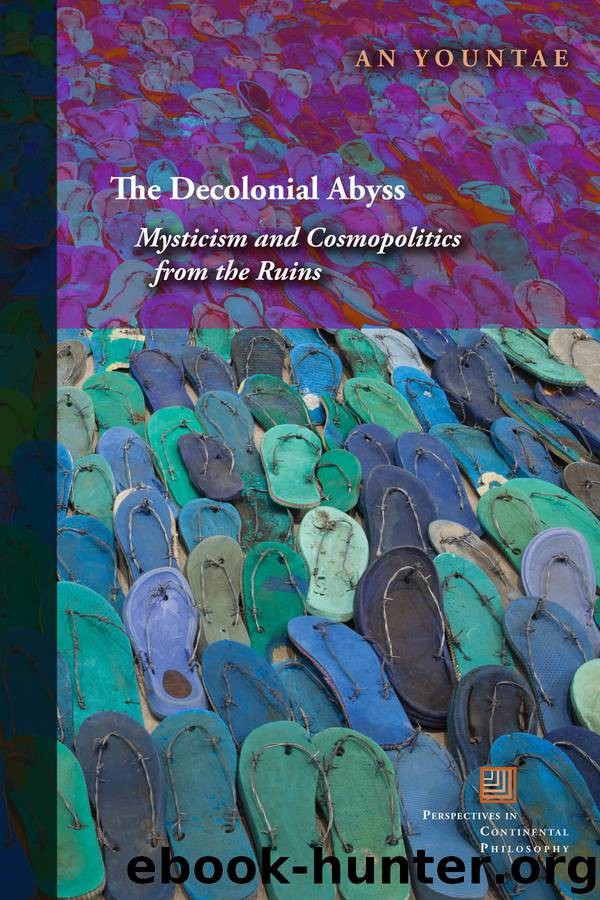The Decolonial Abyss by an yountae

Author:an yountae
Language: eng
Format: epub
Published: 2018-09-14T16:00:00+00:00
Decolonizing the Abyss: A View from the Antilles
While the swirling convergence of multiple creative resonances within the current constructive dialogue has been leading us through numerous emerging thresholds across different abysses, another crucial threshold has yet to be explored, this one all too literal: that is, the shorelines marking the islands of the Antilles. The geopolitical subjugation of the archipelago to the proliferating forces of neocolonialism parallels, in many ways, the distinctive historical reality of the Caribbean, which is marked by the violence of mass annihilation, transportation, slavery, and colonialism. It is thus not surprising that questions of resistance, national identity, and self-determination occupy a central place in the works of many Caribbean thinkers. For the impasse consists not only of the socioeconomic alienation shaping local societies but also of the impaired collective historical identity breached by the history of colonial violence. It is from this sociohistorical context that Antonio Benitez-Rojo speaks of the “meta-archipelago,” the transhistorical experience uniting the “repeating island” of the Caribbean archipelago. He writes, “Beneath the turbulence of árbol, arbre, tree, etc., there is an island that repeats itself until transforming into a meta-archipelago and reaching the most widely separated transhistorical frontiers of the globe.” 1
The question that arises from reflection on the site manifested by the contesting forces of (neo)colonial violence regards the possibility of passage, that is, the positive register of reconstructing the fragmented self and transforming the devastated ground into the horizon of new possibility. Let me answer this question provisionally in advance: the different interlocutors that I am engaging in this book—including the Caribbean thinkers—all seem to subscribe to such possibility. However, their answers as to how to approach such possibility vary significantly. The distance among these answers grows even more significantly when we take into account the social and the geopolitical difference marking the gap between these different contexts. This gap or difference cannot be articulated apart from the black hole of the long history of colonialism and the ongoing reproduction of its violent structure in the global world today. In other words, the abyssal gap between the different answers to the questions regarding the possibility of the passage from trauma to future, from negativity to positivity/possibility, does not just consist of the methodological difference. Rather, this gap emerges out of colonial difference.
As I explained in chapter 1, colonial difference derives from the ongoing effects of coloniality; it points to the irreducible difference of the colonial configuration marked by the spatial articulation of power. In other words, colonial difference signifies the gap opened up by the colonization of the Americas, which, with its racist control of labor and resources, served as a stepping-stone for Europe to consolidate its hegemony at the global level, becoming the axis, as Quijano remarked, “around which all forms of labor were articulated to satisfy the ends of the world market, configuring a new pattern of global control of labor, its resources, and products.” 2 It was on the basis of this control over the structure of
Download
This site does not store any files on its server. We only index and link to content provided by other sites. Please contact the content providers to delete copyright contents if any and email us, we'll remove relevant links or contents immediately.
| Books & Reading | Comparative Literature |
| Criticism & Theory | Genres & Styles |
| Movements & Periods | Reference |
| Regional & Cultural | Women Authors |
4 3 2 1: A Novel by Paul Auster(12392)
The handmaid's tale by Margaret Atwood(7763)
Giovanni's Room by James Baldwin(7346)
Asking the Right Questions: A Guide to Critical Thinking by M. Neil Browne & Stuart M. Keeley(5775)
Big Magic: Creative Living Beyond Fear by Elizabeth Gilbert(5771)
Ego Is the Enemy by Ryan Holiday(5448)
The Body: A Guide for Occupants by Bill Bryson(5096)
On Writing A Memoir of the Craft by Stephen King(4944)
Ken Follett - World without end by Ken Follett(4732)
Adulting by Kelly Williams Brown(4574)
Bluets by Maggie Nelson(4556)
Eat That Frog! by Brian Tracy(4540)
Guilty Pleasures by Laurell K Hamilton(4449)
The Poetry of Pablo Neruda by Pablo Neruda(4107)
Alive: The Story of the Andes Survivors by Piers Paul Read(4032)
White Noise - A Novel by Don DeLillo(4009)
Fingerprints of the Gods by Graham Hancock(4004)
The Book of Joy by Dalai Lama(3986)
The Bookshop by Penelope Fitzgerald(3853)
